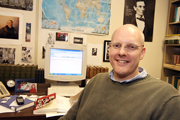October 30, 2008
 |
| Brian Steele. Download image. |
BIRMINGHAM, Ala.- University of Alabama at Birmingham (UAB) Assistant Professor Brian Steele, Ph.D., has been named winner of the 2008 Frederick W. Conner Prize in the History of Ideas. This is Steele's second Conner Prize win.
Steele will receive the award during a ceremony at 3:30 p.m. Wednesday, Nov. 19, at 3:30 p.m. at the Mervyn H. Sterne Library, Henley Room, 917 13th St. S. To attend, please call Joyce Crump at 205-975-0513.
Steele, who teaches in the UAB Department of History, will receive the award for his essay, "'The Yeomanry of the United States Are Not the Canaille of Paris': Thomas Jefferson, American Exceptionalism, and the 'Spirit' of Democracy."
The essay examines political discourse in the late 18th and 19th centuries and "the powerful undercurrent of skepticism" that arose concerning whether people could wisely govern themselves and "an ambivalence about the relationship of democratic majorities to dissenting minorities and individual liberty." Steele says that Thomas Jefferson embraced the idea of popular sovereignty, but at the same time held the belief that "only the American people were ready for self-government."
Steele writes: "Throughout his correspondence and public statements, Jefferson consistently suggested that the American people possessed an exceptional 'spirit' that would both resist tyranny and preserve law and order, as well as a 'public opinion' that could be trusted to give energy and direction to government."
Steele also won the Conner Prize in 2006 for his essay, "Thomas Jefferson's Gender Frontier: The 'Natural Equality' of Women and American National Identity," examining Jefferson's views on the role of men and women in American culture.
The Conner Prize is presented annually to a UAB faculty member for an outstanding essay on the history of ideas. The prize, which carries a $250 award, is named for Frederick Conner, Ph.D., former dean of the School of Arts and Humanities.
Steele has been a member of the UAB faculty since 2005. His area of specialization is early American history.